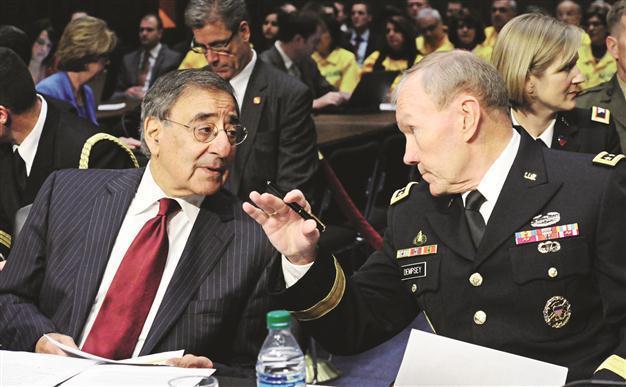Army officials massage Panetta’s Iran remarks
WASHINGTON / JERUSALEM

US Secretary of Defense Panetta (L) and Chairman of Joint Chiefs of Staff Dempsey talk in this photo. Dempsey warns that the US should not ‘miscalculate’ on Iran. AFP photo
The Pentagon and the top U.S. General have sought to pour cold water on remarks by Defense Secretary Leon Panetta after he refused to rule out military action against Iran, which he claimed was in the advanced stages of acquiring a nuclear weapon.
Chairman of U.S. Joint Chiefs of Staff Martin Dempsey said a military option would be “executable if necessary,” but warned that the United States should not “miscalculate” its resolve on Iran.
Tehran could draw Washington into a prolonged conflict which would be “a tragedy for the region and the world,” Dempsey told CNN.
Dempsey’s comments come a day after Panetta said Iran would possess a nuclear weapon within one year, if not less if Tehran had a secret “hidden” site.
The Pentagon spokesman said Panetta was speaking “hypothetically” and that the defense secretary was not suggesting there was new intelligence pointing to secret facilities. In the interview, Panetta also refused to rule out military action to prevent Iran from obtaining nuclear weapons but unlike previous statements, he made no mention of the potential risks associated with a strike that he has warned of repeatedly.
“If they proceed and we get intelligence that they’re proceeding in developing a nuclear weapon, then we will take whatever steps are necessary to stop it,” Panetta said.
The Pentagon insisted Panetta’s view of Iran’s nuclear project had not changed and added that if Tehran made the decision to produce weapons-grade uranium, it would be detected by U.N. inspectors who have regular access to the country’s facilities.
Largest ever missile defense exercise“Should they make a decision to move to highly enriched uranium, those inspectors would be able to readily detect it,” Agence France-Presse quoted Cpt. John Kirby as saying. “And we would have at that point, plenty of time to react on our own.”
A U.S. official, speaking on condition of anonymity, said the country’s intelligence agencies had not changed their view on the state of Iran’s program.
Meanwhile, Israel plans to hold the largest-ever missile defense exercise in its history this spring amid Iranian efforts to obtain nuclear weapons, Israeli daily Jerusalem Post reported. Last week, Lt.-Gen. Frank Gorenc, commander of the U.S.’s Third Air Force based in Germany, visited Israel to finalize plans for the upcoming drill, which is expected to involve the deployment of several thousand American soldiers in Israel, the report said.
The U.S. will also bring its Terminal High Altitude Area Defense (THAAD) and ship-based Aegis ballistic missile defense systems to Israel to simulate the interception of missile salvos against the country. The U.S. systems will work in conjunction with Israel’s missile defense systems – the Arrow, Patriot and Iron Dome.
The Israeli government’s watchdog agency also said the country was short on bomb shelters and was ill-prepared to protect its citizens in the event of war, the Associated Press reported. The state comptroller’s annual report, published in part Dec. 20, said Israel had not learned the lessons from the 2006 Lebanon war, when dozens of Israeli civilians were killed by Hezbollah rockets.
